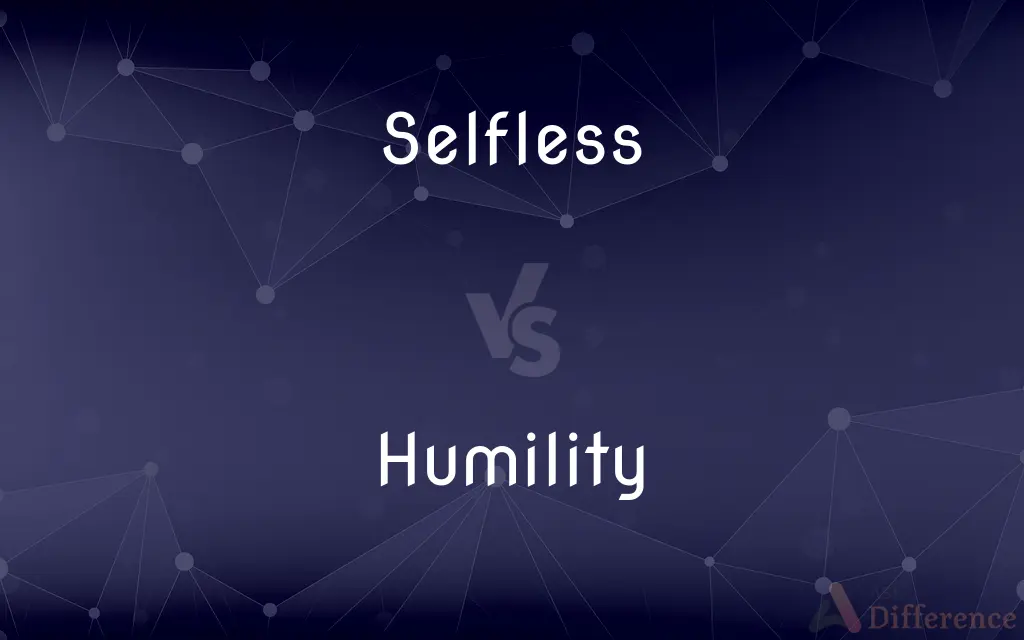Selfless vs. Humility — What's the Difference?
Edited by Tayyaba Rehman — By Urooj Arif — Updated on April 5, 2024
Selflessness involves prioritizing others' needs over one's own, often linked to altruism, while humility is the quality of having a modest or low view of one's importance, not seeking to elevate oneself above others.

Difference Between Selfless and Humility
Table of Contents
ADVERTISEMENT
Key Differences
Selflessness is characterized by an individual's ability and willingness to put the needs, well-being, and interests of others before their own. It manifests in acts of kindness, generosity, and sacrifice without expecting anything in return. This trait is often associated with altruistic behavior, where the focus is on benefiting others, even at a personal cost. Humility, on the other hand, is a personal quality that reflects a modest opinion or estimation of one's own importance. Humble individuals do not seek to assert their superiority or achievements over others and often recognize and accept their own limitations and weaknesses without allowing these acknowledgments to diminish their self-worth.
While selflessness focuses on actions towards others, humility centers on an individual's self-perception and attitude towards themselves in relation to others. A selfless person acts with the welfare of others in mind, potentially sacrificing their own needs or desires. In contrast, a person embodying humility might not necessarily act to their own detriment but will maintain an unassuming and respectful attitude, not seeking praise or recognition for their deeds or talents.
The motivations behind selflessness and humility can also differ. Selfless actions are driven by a genuine concern for the welfare of others, motivated by empathy and compassion. Humility, however, stems from an understanding and acceptance of one's place in the context of a broader perspective, recognizing that one is not the center of the universe. This understanding does not stem from a lack of self-esteem but from a balanced self-view that appreciates both strengths and limitations.
In practice, selflessness and humility often intersect; many selfless acts require a degree of humility, as they involve putting others first without seeking acknowledgment or reward. Similarly, humility can lead to selfless behavior, as a humble outlook includes recognizing the needs and values of others as equal to or greater than one's own.
Culturally, both qualities are highly valued across various societies and are often promoted in philosophical, religious, and ethical teachings as virtues that contribute to the welfare of the community and the moral integrity of the individual. They are seen as antidotes to selfishness, egoism, and arrogance, fostering a more cooperative, compassionate, and harmonious society.
ADVERTISEMENT
Comparison Chart
Definition
Putting others' needs and well-being before one's own.
A modest view of one's importance, not seeking self-elevation.
Focus
Actions towards others.
Self-perception and attitude.
Motivation
Empathy and compassion for others.
Understanding and acceptance of one's relative importance.
Manifestation
Acts of kindness, generosity, and sacrifice.
Modest behavior, not seeking praise or recognition.
Cultural Value
Promoted as contributing to community welfare.
Valued for fostering moral integrity and cooperation.
Compare with Definitions
Selfless
Selflessness is prioritizing others' welfare over one's own interests.
Volunteering for a crisis hotline is an act of selflessness.
Humility
Humility stems from recognizing one's strengths and weaknesses.
Admitting mistakes and learning from them is a sign of humility.
Selfless
It involves generous and sacrificial actions.
Donating anonymously to a charity is a selfless gesture.
Humility
It fosters a respectful and cooperative environment.
Leadership with humility inspires loyalty and trust among team members.
Selfless
Selflessness is motivated by empathy and compassion.
Offering to help a struggling colleague without being asked shows selflessness.
Humility
Humility involves a modest view of one's significance.
Despite her achievements, she speaks of her work with humility.
Selfless
It is a trait that enhances community well-being.
Selflessness in crisis situations often leads to remarkable acts of heroism.
Humility
It is characterized by not seeking praise.
He accepted the award with humility, attributing his success to his team.
Selfless
Acts of selflessness aim at benefiting others.
Spending one's holiday helping at a homeless shelter exemplifies selflessness.
Humility
Humble individuals do not assert superiority over others.
His humility is evident in how he treats everyone with equal respect.
Selfless
Concerned more with the needs and wishes of others than with one's own; unselfish
An act of selfless devotion
Humility
The quality or condition of being humble.
Selfless
Having, exhibiting, or motivated by no concern for oneself; unselfish
A selfless act of charity.
Humility
Humility is the quality of being humble. Dictionary definitions accentuate humility as a low self-regard and sense of unworthiness.
Selfless
Having, exhibiting or motivated by no concern for oneself but for others; unselfish.
In a selfless act of gratitude for saving his mother's life, Peter committed to giving money to his local breast cancer charity each year for the rest of his life.
Humility
The characteristic of being humble; humbleness in character and behavior.
Selfless
Having no regard to self; unselfish.
Lo now, what hearts have men! they never mountAs high as woman in her selfless mood.
Humility
The state or quality of being humble; freedom from pride and arrogance; lowliness of mind; a modest estimate of one's own worth; a sense of one's own unworthiness through imperfection and sinfulness; self-abasement; humbleness.
Serving the Lord with all humility of mind.
Selfless
Showing unselfish concern for the welfare of others
Humility
An act of submission or courtesy.
With these humilities they satisfied the young king.
Humility
A disposition to be humble; a lack of false pride;
Not everyone regards humility as a virtue
Humility
A humble feeling;
He was filled with humility at the sight of the Pope
Common Curiosities
Is humility a sign of weakness?
No, humility is a strength that demonstrates a secure and confident understanding of one's value and the value of others.
How are selflessness and humility cultivated?
Through empathy, reflection, and the conscious practice of putting others first and recognizing one's place in a broader context.
Can selflessness lead to negative outcomes?
Yes, excessive selflessness without self-care can lead to burnout and resentment, underscoring the need for balance.
Can one be humble and not selfless?
Yes, one can have a modest view of oneself without necessarily prioritizing the needs of others over their own.
Can selflessness and humility coexist?
Absolutely, and they often complement each other, as humility can inspire selfless actions, and selfless acts require humility.
Do selflessness and humility impact personal happiness?
Yes, both can enhance personal fulfillment and happiness by fostering meaningful connections and a sense of purpose.
How do selflessness and humility benefit society?
They promote altruism, cooperation, and mutual respect, essential for building strong, supportive communities.
How do different cultures view selflessness and humility?
While universally valued, cultural nuances influence how these virtues are expressed and prioritized.
Are there any historical figures known for selflessness and humility?
Many, including Mahatma Gandhi, Mother Teresa, and Nelson Mandela, are celebrated for embodying both qualities.
What challenges might one face in practicing selflessness and humility?
Challenges include overcoming ego, societal pressures for individual success, and finding the balance between helping others and self-care.
How do selflessness and humility affect leadership?
Leaders who embody these qualities can inspire trust, foster teamwork, and drive positive change, leading by example.
Why are selflessness and humility important in relationships?
They contribute to healthy, balanced relationships by ensuring respect, understanding, and prioritizing the well-being of the partner.
What is the role of self-awareness in developing humility?
Self-awareness is crucial for humility, as it involves recognizing one's limitations and the value of others' perspectives.
How does one balance selflessness with self-care?
By recognizing the importance of one's own well-being as essential to effectively caring for others, ensuring neither is neglected.
Can selflessness and humility be taught?
While innate to some degree, both can be nurtured through guidance, education, and practice, emphasizing their importance in personal and social contexts.
Share Your Discovery

Previous Comparison
Truth vs. Sincerity
Next Comparison
Cradle vs. CrecheAuthor Spotlight
Written by
Urooj ArifUrooj is a skilled content writer at Ask Difference, known for her exceptional ability to simplify complex topics into engaging and informative content. With a passion for research and a flair for clear, concise writing, she consistently delivers articles that resonate with our diverse audience.
Edited by
Tayyaba RehmanTayyaba Rehman is a distinguished writer, currently serving as a primary contributor to askdifference.com. As a researcher in semantics and etymology, Tayyaba's passion for the complexity of languages and their distinctions has found a perfect home on the platform. Tayyaba delves into the intricacies of language, distinguishing between commonly confused words and phrases, thereby providing clarity for readers worldwide.














































